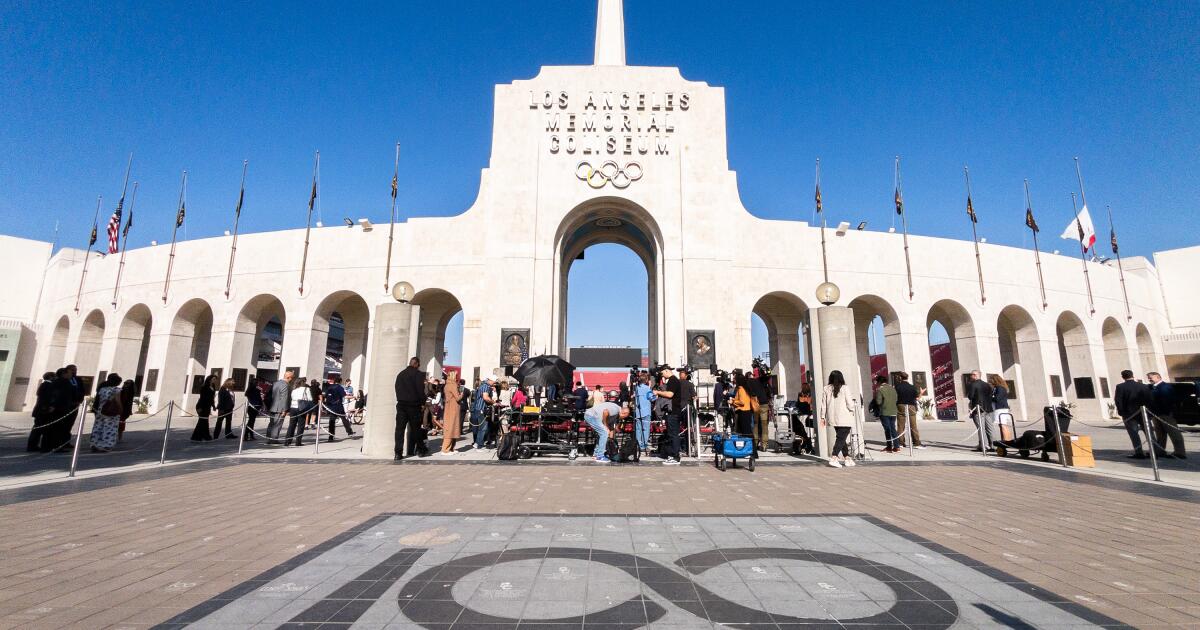More than 40 years after L.A. produced the most financially successful Olympic Games in history, the 2028 Olympics will feature a new advertising revenue path for the Games.
In an Olympic first, venues used for the 2028 Olympics and Paralympics will be allowed to have corporate sponsor names after LA28 and the International Olympic Committee came to a tradition-bucking agreement announced Thursday.
Historically, the IOC has sought to limit corporate influence by keeping venues free from advertising. Major sponsors are still ubiquitous at the Games, where only Visa credit cards are accepted and Coca-Cola products monopolize the concession stands, but venues and fields of play have remained commercial-free. The traditional clean venue policy has forced L.A. organizers to refer to SoFi Stadium, which will host Olympic swimming, officially as “2028 Stadium” or “the Stadium in Inglewood.”
Not only will the new agreement help logistically by not requiring well-known venues to adopt generic temporary nicknames, but it will ease costs as existing signage can remain in place outside of the venue.
“Our job is to push and our job is to do what’s best for the Olympics in Los Angeles,” LA28 chairman Casey Wasserman told The Times. “Our job in those conversations [with the IOC] was to explain why this was more than just about money. It was about experience and value and opportunity.”
The additional revenue opportunities from naming rights agreements will help cover what LA28 has promised will be a privately funded Games.
Wasserman said the private organizing committee has contracts for about 70% of the projected $2.5 billion domestic sponsorship goal. Any money that comes from the new naming opportunities are additions to the previously estimated revenue, Wasserman said. Needing to cover the budget of $7.1 billion, LA28 has added eight corporate sponsors this year, already surpassing the total from 2024.
“The momentum is meaningful and real,” Wasserman said. “We feel good about where we are but we certainly don’t take that for granted.”
For venues that already have sponsorship names, such as Crypto.com Arena, BMO Stadium or the Intuit Dome, the existing company can sign on as a founding-level partner to retain its naming rights during the Games, the highest level of domestic sponsorship. Otherwise, the venue will be renamed without a sponsor.
The changes have already begun. LA28 announced that Honda Center will retain its name for the Olympic volleyball competition after the Japanese auto maker established its deal with LA28 in June. Squash will make its Olympic debut at the newly named Comcast Squash Center at Universal Studios as the company also holds U.S. broadcasting rights to the Olympic and Paralympic Games.
Broadcasters can now refer to the venues with their corporate sponsor names, providing a major global stage. Any signage outside of the venue will remain in place for existing structures. Naming rights are available for the 19 temporary facilities with first bidding opportunities going to members of The Olympic Partners (TOP) program.
But the field of play will remain free from visible sponsorships.
“The IOC is always looking to recognize and support the critical role and contributions of Olympic commercial partners, both TOP and domestic. We also want to support LA28 in their efforts to create new approaches and commercial opportunities, whilst maintaining the principles of the ‘clean venue policy’ that is unique to the Olympic Games,” an IOC spokesperson said in a statement to The Times. “It is a reality that many venues in L.A. and in the U.S. already have commercial naming rights and have become commonly recognized as such by the general public. Therefore, following discussions, the IOC is supporting the LA28 initiative that takes into account market realities of venue naming and generates critical revenue to stage the Games.”
With less than three years before the Olympics open on July 14, 2028, the Games delivery process has come with challenges. Soon after the IOC’s coordination commission left the city to glowing reviews of LA28’s planning progress in June, immigration raids and protests began in L.A. This month, President Trump named himself the chair of a task force to oversee the federal government’s involvement in the Games, but concerns about safety and visas for would-be international visitors have persisted.
In L.A., where the city recently closed a nearly $1-billion budget deficit, transportation updates have lagged behind and leaders are in negotiations with Olympic organizers about services including security, trash removal and traffic control. While LA28 has promised to cover all expenses related to the Games, taxpayers still face potential risk.
If the group goes over budget, L.A. would be responsible for the first $270 million of the deficit.
